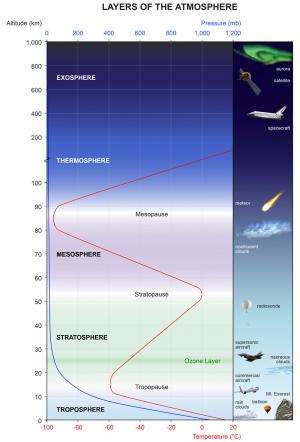Can Changes in Earth's Magnetic Field Effect the Weathwr

New research, published this week, has provided scientists with greater insight into the climatic changes happening in the upper atmosphere. Scientists found that changes in the Earth's magnetic field are more than relevant for climatic changes in the upper atmosphere (about 100-500 km above the surface) than previously thought. Understanding the crusade of long-term change in this area helps scientists to predict what will happen in the future. This has fundamental implications for life back on earth.
A expert understanding of the long-term behaviour of the upper atmosphere is essential; it affects a lot of satellite-based engineering science, such as global navigation systems and high-frequency radio advice systems. Some satellites fifty-fifty operate within the upper atmosphere itself.
The increase in atmospheric CO2 concentration has been idea to exist the main cause of climatic changes at these high altitudes. This study suggests that magnetic field changes that have taken place over the past century are every bit important.
Both increasing levels of CO2 and changes in the World'southward magnetic field bear upon the upper atmosphere, including its charged portion, likewise known as the ionosphere. Dr. Ingrid Cnossen from the British Antarctic Survey used figurer simulations to compare the furnishings of these two factors over the past century.
While CO2 causes estrus to be trapped in the lower atmosphere, it really cools the upper atmosphere. The simulations show that the increase in COtwo concentration over the past 100 years has caused the upper atmosphere, at around 300 km altitude, to cool by effectually 8 degrees. At the same altitude, changes in the Globe's magnetic field caused a like amount of cooling over parts of North America, but caused a warming over other parts of the world, with the strongest warming, of upwardly to 12 degrees, located over Antarctica.
Dr. Ingrid Cnossen said: "Computer simulations are a very of import tool in understanding the causes of climatic change at high altitudes. We even so tin't explicate all of the long-term trends that have been observed, but it helps that we at present know how important the magnetic field is."
The new simulations also indicate that rising CO2 levels take caused the densest role of the ionosphere to lower by about v km globally. Changes in the Earth'due south magnetic field can cause much larger changes, but they are very dependent on location and tin be either positive or negative; over the southern Atlantic Ocean a decrease in peak of upwardly to 50 km was found, while an increment in height of up to 20 km was institute over western Africa.
The findings are published in the Journal of Infinite Weather and Space Climate.
Citation: Earth'due south magnetic field is important for climate change at high altitudes (2014, May 26) retrieved 17 February 2022 from https://phys.org/news/2014-05-globe-magnetic-field-important-climate.html
This document is subject to copyright. Apart from any fair dealing for the purpose of individual study or research, no part may be reproduced without the written permission. The content is provided for information purposes only.
Source: https://phys.org/news/2014-05-earth-magnetic-field-important-climate.html
Postar um comentário for "Can Changes in Earth's Magnetic Field Effect the Weathwr"